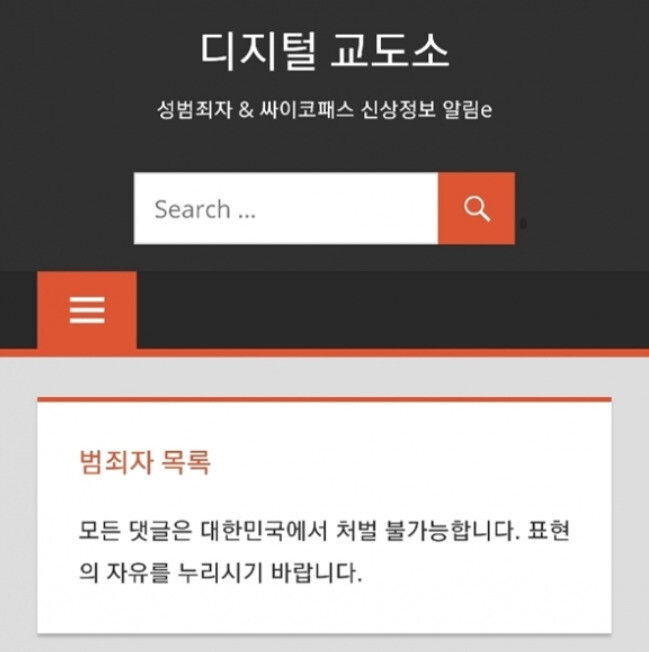hankyoreh
Links to other country sites 다른 나라 사이트 링크
[Editorial] Vigilante justice has gotten out of hand with Digital Prison punishing innocent individuals

The website Digital Prison, which publishes personal information about alleged sex offenders, is facing scrutiny amid emerging evidence that it has victimized innocent people. The website was established by people dissatisfied with South Korean courts’ lenient approach to sex offenses, people who think that those offenders should be punished by being doxed in addition to whatever sentence they are given in the criminal justice system. But if that approach is causing harm to innocent people, it’s legitimacy should be called into question. No matter how just a cause may be, it requires a reasonable approach and a responsible attitude.
A university professor was doxed by Digital Prison in June for allegedly purchasing illicit pornographic material, but an investigation by the police eventually cleared him of all charges. But the two intervening months were a time of extreme suffering for that professor. He was inundated by insulting and threatening phone calls and text messages via the phone number posted on the website, and he was referred to the ethics committee of the academic society to which he belongs. No wonder the professor’s exoneration by the police investigation felt like “escaping from the jaws of death.”
There was another incident in July when Digital Prison admitted that it had doxed an innocent person, after that the person complained to the website. And a university student who had professed his innocence after being doxed by the website ultimately killed himself on Sept. 3.
Sex crimes are serious offenses that demand stern punishment. But for that very reason, people who are unfairly stigmatized as sex offenders suffer severe harm. Before someone is publicly accused of a sex crime, the facts of the case need to be thoroughly vetted. Letting righteous indignation steer our actions when we lack the ability to determine exactly what happened could undermine the very cause of eliminating sex crimes.
In particular, publishing personal information is a punitive measure equivalent to ostracizing someone from society. That’s why the authorities don’t release the personal information of convicted sex offenders unless that’s deemed necessary in a separate review. It hardly needs to be said that such punishment is extremely damaging when meted out to an innocent individual. There should be serious legal consequences for those who publish other people’s personal information outside of the framework of the legal system.
The very fact that private individuals are taking it upon themselves to release personal information about sex offenders is a reminder of how dysfunctional the current system is. Despite repeated cases of heinous sexual exploitation in digital formats, the criminal justice system has failed to keep up with the times. Swift measures should be taken to toughen the sentencing guidelines for sex crimes, and the standards and procedures for releasing personal information need to be adjusted to meet the expectations of society. The fundamental solution is working constantly to improve improving public institutions so that we can punish sex offenders sternly while also preventing the infringement of human rights.
Please direct comments or questions to [english@hani.co.kr]

Editorial・opinion
![[Column] The state is back — but is it in business? [Column] The state is back — but is it in business?](https://flexible.img.hani.co.kr/flexible/normal/500/300/imgdb/original/2024/0506/8217149564092725.jpg) [Column] The state is back — but is it in business?
[Column] The state is back — but is it in business?![[Column] Life on our Trisolaris [Column] Life on our Trisolaris](https://flexible.img.hani.co.kr/flexible/normal/500/300/imgdb/original/2024/0505/4817148682278544.jpg) [Column] Life on our Trisolaris
[Column] Life on our Trisolaris- [Editorial] Penalties for airing allegations against Korea’s first lady endanger free press
- [Editorial] Yoon must halt procurement of SM-3 interceptor missiles
- [Guest essay] Maybe Korea’s rapid population decline is an opportunity, not a crisis
- [Column] Can Yoon steer diplomacy with Russia, China back on track?
- [Column] Season 2 of special prosecutor probe may be coming to Korea soon
- [Column] Park Geun-hye déjà vu in Yoon Suk-yeol
- [Editorial] New weight of N. Korea’s nuclear threats makes dialogue all the more urgent
- [Guest essay] The real reason Korea’s new right wants to dub Rhee a founding father
Most viewed articles
- 1[Column] Why Korea’s hard right is fated to lose
- 2Amid US-China clash, Korea must remember its failures in the 19th century, advises scholar
- 360% of young Koreans see no need to have kids after marriage
- 4[Column] The state is back — but is it in business?
- 5Presidential office warns of veto in response to opposition passing special counsel probe act
- 6[Editorial] Stagnant youth employment poses serious issues for Korea’s future
- 7Inside the law for a special counsel probe over a Korean Marine’s death
- 8[Column] Can Yoon steer diplomacy with Russia, China back on track?
- 9[Guest essay] Maybe Korea’s rapid population decline is an opportunity, not a crisis
- 10[Editorial] Penalties for airing allegations against Korea’s first lady endanger free press